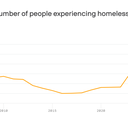A doctor who calls out diet misinformation shared 3 red flags that could harm your health

SDI Productions/Getty Images
- Bogus health advice is widespread online, and often follows a few strategies.
- Misinformation can harm a person's physical and mental health.
- Look out for big claims and conspiratorial tones, Dr. Idrees Mughal advised.
A doctor who challenges nutrition misinformation online and wrote a book about common tricks, listed red flags to look out for.
Health misinformation can cause real damage to physical and mental health so it's crucial to learn how to spot it, said Dr. Idrees Mughal, a medical doctor with a master's degree in nutritional research.
Mughal was speaking last month at an online nutrition misinformation conference hosted by the Royal College of Medicine and the nutrition organization Nutritank.
It's impossible to be knowledgeable about all health claims, but being able to spot patterns can help you spot fakery, Mughal said.
He are his three red flags:
Absolute language
Words like "most," "top," "worst," "best," "always," and "never" do not belong in health advice because they don't consider individual differences, Mughal said. "No one who is truly evidence-based would use terms like these."
People have different needs and goals, and no one ingredient or diet can be the top way to eat for the whole population, he said.
Take nuts for example: They are a good source of fiber, protein, and healthy fats, and some studies suggest that eating them regularly is linked to longevity. But nut allergies are widespread, and can be fatal — so the advice won't work for everyone.
A quick fix
"The promise of a quick fix is always a massive red flag," Mughal said.
People are much more receptive to things that can be done fast. Silver-bullet-type content tends to garner more engagements, clicks, and likes, he said.
But chronic diseases that can be impacted by our lifestyle choices, such as obesity, type 2 diabetes, and cardiovascular disease, require a long-term lifestyle management treatment plan. "If you didn't develop them overnight, you're not going to fix them overnight," he said.
Creating an 'us versus them' mentality
Health misinformation can undermine public health and lead to mistrust in medical professionals, Mughal said.
Some wellness influencers leverage this mistrust to market themselves and create an "us versus them" mentality, he said.
Rather than providing evidence-based information, they might say things like, "The healthcare industry doesn't want you to know this. I'm about to let you in on a huge secret," which frames them as an expert with hidden knowledge, he said. At the same time, it encourages you to distrust the more established authorities
"It's a very kind of predatory wellness marketing tactic," Mughal said.


